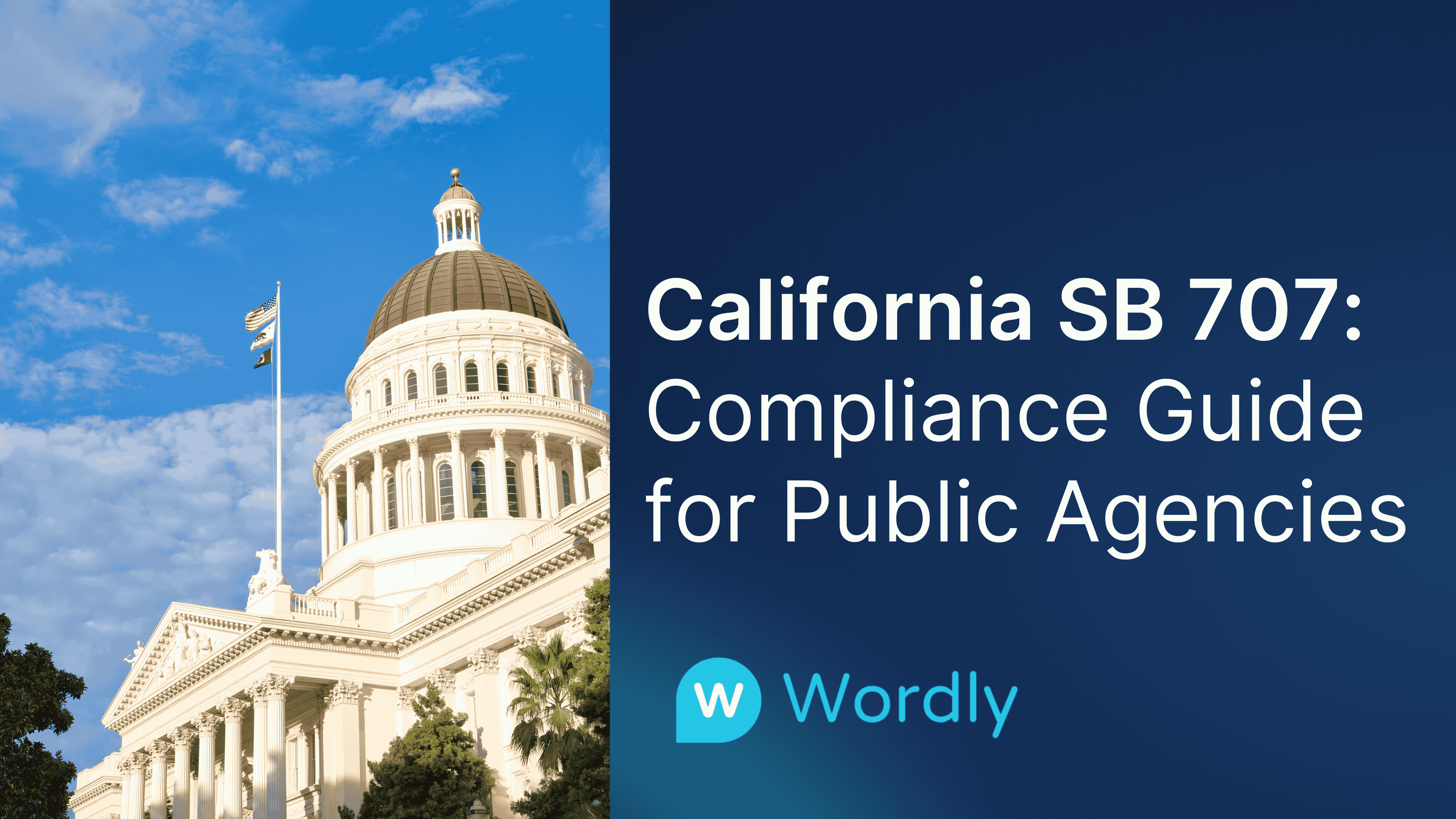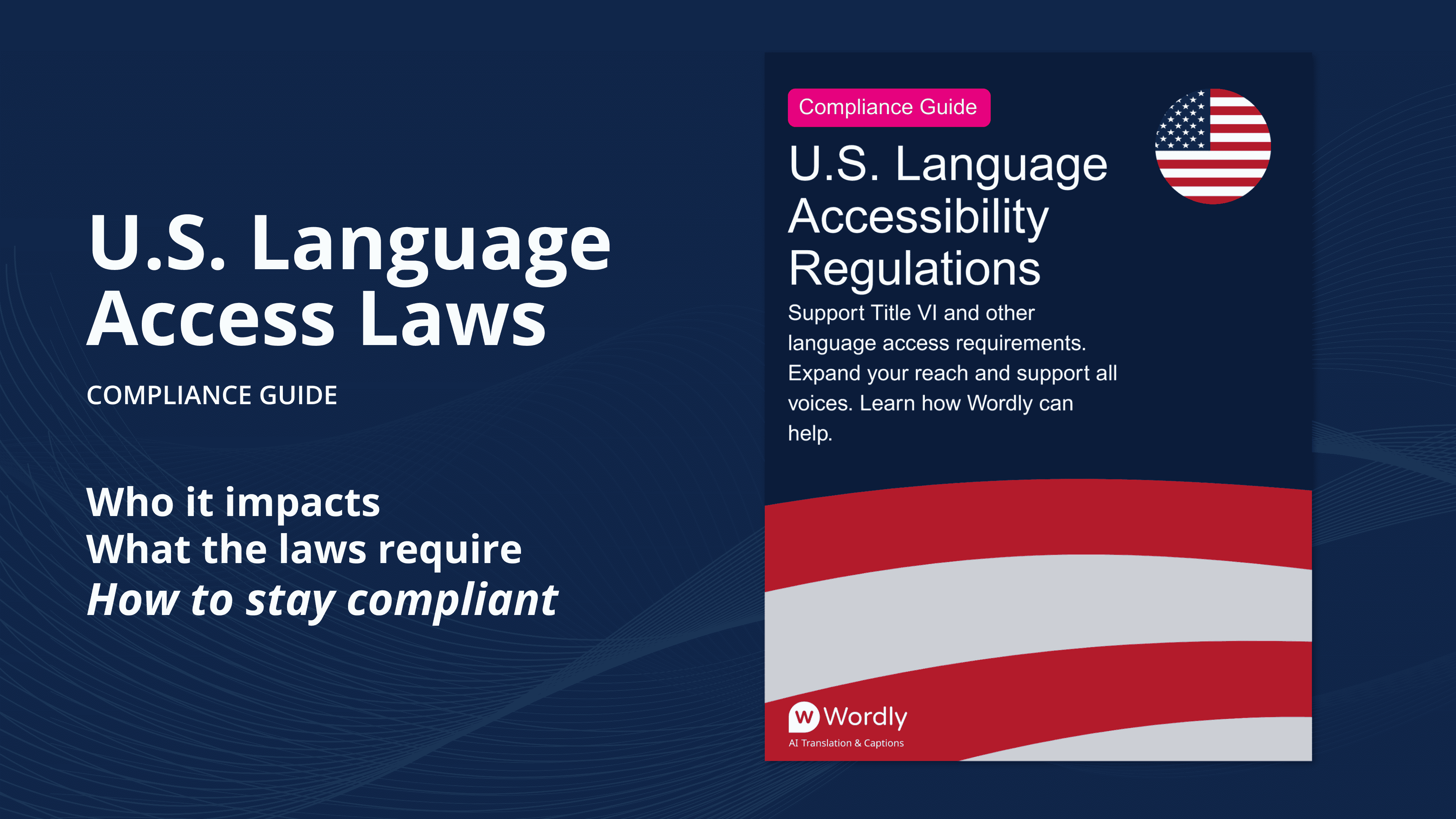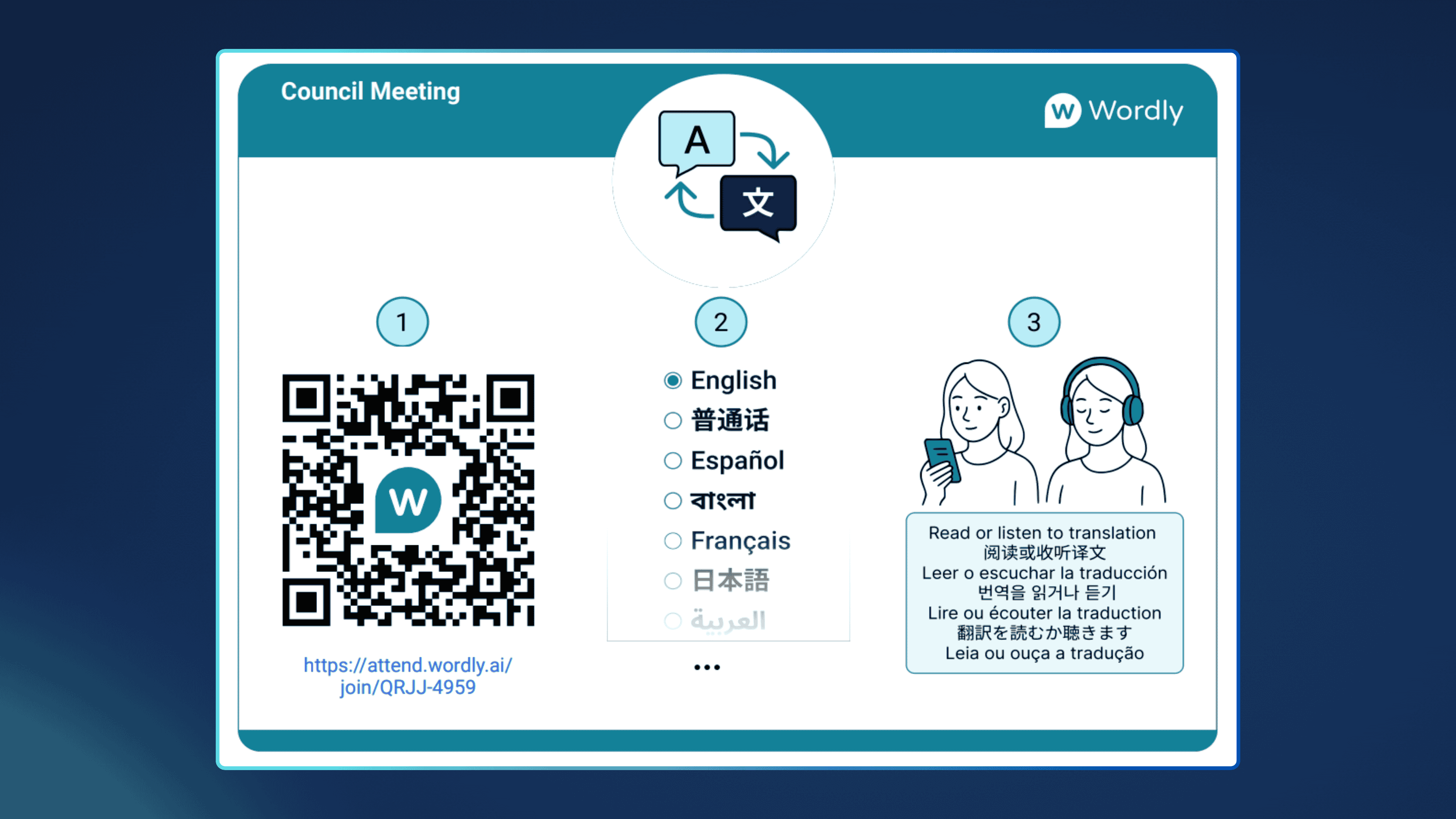SB 707 Compliance Guide for California Public Agencies

.png)
.png)

SB 707 Expands and Modernizes Open Meeting and Teleconferencing Requirements under the Brown Act
California Senate Bill 707 (SB 707) marks the most significant update to the state's open-meeting laws in decades. Known as the Brown Act, this legislation modernizes how public agencies conduct meetings, strengthening requirements for language access, remote participation, and real-time captioning.
Effective January 1, 2026, with enhanced obligations for larger agencies beginning July 1, 2026, SB 707 is designed to ensure that all Californians, including residents with limited English proficiency (LEP) and those with disabilities, can participate fully in the democratic process.
This guide breaks down what your agency needs to know about SB 707. We will cover the key requirements, who must comply, and how you can leverage technology to meet these new standards efficiently and affordably.
Table of Contents:
- What is California Senate Bill 707?
- Who Must Comply with SB 707?
- Key SB 707 Requirements Explained
- Penalties for Noncompliance
- How to Prepare for the 2026 Deadlines
- How Wordly Can Help Your Agency Meet SB 707 Mandates
- Frequently Asked Questions (FAQs)
- Take the Next Step Toward Compliance
What is California Senate Bill 707?
California SB 707 amends the Ralph M. Brown Act, the foundational law governing open meetings for local government bodies. Signed into law in October 2025, its primary goal is to modernize public access by codifying the hybrid meeting formats that became common during the COVID-19 pandemic and ensuring they are accessible to all residents.
The bill introduces specific mandates around technology and language access to remove barriers that have traditionally excluded non-English speakers and individuals with disabilities from civic participation. It requires agencies to provide two-way remote participation options, offer live captioning, and translate key documents for significant language populations within their communities.
Who Must Comply with SB 707?
SB 707 applies broadly to nearly all public agencies in California that are subject to the Brown Act. If your organization holds public meetings, it is highly likely you are covered. This includes, but is not limited to:
- City and County Governments: City councils, county boards of supervisors, and their various commissions and committees.
- Education Boards: School districts, community college districts, and county offices of education.
- Special Districts and Authorities: This is a large category that includes:
- Transportation and Transit: Bay Area Rapid Transit (BART), LA County Metropolitan Transportation Authority (LACMTA), Santa Clara Valley Transportation Authority (VTA), and other regional transit agencies.
- Utilities: Sacramento Municipal Utility District, Los Angeles Department of Water and Power, and other municipal utility districts.
- Water Agencies: Metropolitan Water District of Southern California, East Bay Municipal Utility District, and other county water authorities.
- Housing and Redevelopment: California Housing Finance Agency and other local housing authorities.
- Ports and Airports: Port of LA, San Francisco International Airport Authority, and other regional airport authorities.
- Regional Bodies and Joint Powers Authorities (JPAs): Southern California Association of Governments, Association of Bay Area Governments, San Diego Association of Governments, and other regional councils of governments.
- State and Quasi-Public Commissions: Boards like the California Coastal Commission, California Energy Commission, and California Public Utilities Commission when acting in a capacity covered by the Brown Act.
The law also defines an “eligible legislative body”—agencies serving a population of 250,000 or more—which will face enhanced language access requirements starting July 1, 2026.
Key SB 707 Requirements Explained
Hybrid Meetings and Remote Participation
The law requires legislative bodies to offer a hybrid meeting format. The public must have the option to participate remotely through a two-way audio and video platform. This is a significant shift from previous rules, as it mandates a virtual component to ensure broad accessibility. Agencies can no longer hold in-person-only meetings.
Members of a legislative body can now attend via teleconference as a reasonable accommodation under the Americans with Disabilities Act (ADA), provided they remain visible and audible to the public.
Real-Time Subtitling & Titling
To ensure meetings are accessible to individuals who are deaf or hard of hearing, SB 707 requires real-time subtitling for any portion of a meeting that is broadcast or live-streamed. This applies to all hybrid meetings where the public can watch remotely.
Language Translation and Interpretation
This is one of the most transformative parts of the bill. Eligible legislative bodies must translate meeting agendas and instructions on how to participate into any "applicable language." A language is deemed "applicable" if it is spoken by a local population of which at least 20% speak English less than "very well."
Additionally, agencies must:
- Make their public meeting information webpage available in these applicable languages.
- Provide "reasonable assistance" to members of the public who bring their own interpreters, such as ensuring adequate seating and allowing extra time for interpretation.
Community Outreach
The bill encourages proactive inclusion. Agencies must make "reasonable efforts" to invite and inform groups that do not traditionally participate in public meetings. This includes outreach to non-English media organizations and civic groups serving diverse communities. While the law gives agencies broad discretion here, the intent is clear: go beyond simple notification and actively engage your entire community.
Penalties for Noncompliance
The Brown Act does not typically have fines attached to a violation; instead, the penalties are focused on rendering the illegal action void and shifting the financial burden of litigation onto the violating agency.
The Role of SB 707 on Penalties
SB 707 specifically impacted the penalties in the following ways:
- Extended Invalidation Window: Increased the time frame for the public to file a cease-and-desist letter to 12 months after the alleged violation, giving people more time to challenge an illegal action.
- Protection for Translation: Importantly, the law prohibits legal actions against an agency specifically regarding the content or accuracy of any translation or for the failure to engage in the new community outreach required by the language-equity section (GC 54953.4). This is a shield for the "eligible legislative bodies" that are subject to the new requirements.
To ensure full compliance under the Brown Act, boards must focus on the general rules that do apply to them, such as the expanded remote participation rules for board members ("just cause" teleconferencing) and the mandatory distribution of the Brown Act to new members.
How to Prepare for the 2026 Deadline
With the first deadline of January 1, 2026, approaching, public agencies should begin preparing now. Here is a timeline to guide your efforts:
- Early⟶ Mid-2025: Assess and Plan
- Identify Your Requirements: Determine if your agency is considered an "eligible legislative body" to understand which translation mandates apply to you.
- Audit Your Technology: Evaluate your current audiovisual and streaming capabilities. Can you support two-way video participation and real-time captioning?
- Research Solutions: Explore technology platforms that can provide live captions and translation for meetings and documents.
- Mid-2025 ⟶ End of 2025: Implement and Test
- Procure Technology: Select and implement a solution like Wordly to handle your captioning and translation needs.
- Update Policies: Revise your public meeting procedures to align with SB 707 requirements.
- Train Staff: Ensure your clerks, IT staff, and public information officers understand the new workflows for hybrid meetings and language access.
- Conduct Test Runs: Before your first official hybrid meeting under the new law, run comprehensive tests of your remote access, captioning, and translation systems.
- January 1, 2026: General Compliance Begins
- All agencies must provide hybrid meeting options with two-way participation and live captioning.
- July 1, 2026: Enhanced Compliance Begins
- Eligible legislative bodies must have their agenda and website translation processes in place.
For a deeper dive into compliance, our U.S. Language Access Compliance Guide provides additional context on federal laws like the ADA and Title VI.

How Wordly Can Help Your Agency Meet SB 707 Mandates
Meeting the comprehensive requirements of SB 707 may seem daunting, especially for agencies with limited budgets and staff. Traditional methods, such as hiring live interpreters and manual translators for every language, can be logistically challenging, expensive, and difficult to scale.
This is where AI-powered solutions like Wordly offer a powerful advantage. Wordly is an AI translation platform purpose-built to help government agencies achieve compliance affordably and efficiently.

Here’s how Wordly addresses key SB 707 requirements:
- Live Translation and Captions: Wordly provides live, AI-powered captions and audio translation in dozens of languages. Attendees can access translation on their own devices with a simple QR code—no downloads required. This instantly satisfies the real-time subtitling rule and enhances language access far beyond the minimum mandate.
- Seamless Integration: Wordly works with all major video conferencing and streaming platforms, making it easy to add translation and captions to your existing hybrid meeting setup.
- Accessibility for All: By offering both translated captions and audio, Wordly supports attendees who are hard of hearing, LEP, or simply prefer to read captions while listening to presentations. Our technology works seamlessly with leading bluetooth hearing aids.
- Multilingual Instructions: Wordly provides multilingual instructions for accessing live translation and subtitles, which you can distribute alongside the translated agenda to ensure full compliance with California SB 707's requirement.
- Cost-Effective and Scalable: Because Wordly is powered by AI, it eliminates the need to book and manage in-person interpreters. It's an "always-on" solution that scales to any number of languages and attendees without a proportional increase in cost.
Watch our Compliance Videos for Government & Education to see how agencies are already using Wordly to foster inclusion.
![Graphic with a woman speaking in Japanese at a public city council meeting. On the right side, Wordly’s language selector URL demonstration. Text in graphic reads “Instant Translation & Captions,” “In-person, Hybrid, Virtual,” and “Book your SB 707 Compliance Meeting” [With Wordly].](https://cdn.prod.website-files.com/61707b4f874fa2400482b081/691d34c6e284c14edec7f739_SB707_Demo_Block.png)
Frequently Asked Questions (FAQs)
1. Does SB 707 apply to our agency's subcommittees?
Yes, the Brown Act and its amendments, including SB 707, generally apply to the legislative bodies of local agencies, which includes their boards, commissions, and committees, even if they are only advisory.
2. How do we determine the "applicable languages" for translation in our jurisdiction?
You will need to use data, likely from the U.S. Census Bureau's American Community Survey (ACS), to identify language communities in your service area where 20% or more of the speakers also report speaking English less than "very well."
3. Are AI-generated captions considered compliant for accessibility?
Yes, as long as the captions are accurate and provided in real time, they can help meet the "effective communication" standard under the ADA. Advanced AI platforms like Wordly deliver high accuracy rates that make them a reliable solution.
4. Can we pass the cost of these new requirements on to the public?
No. The Brown Act prohibits charging a fee for public participation. The costs of compliance, including technology and translation, must be covered by the agency. The good news is Wordly makes it easy and affordable to support live translation and captions for dozens of languages.
5. What happens if our agency fails to comply with SB 707?
Non-compliance with the Brown Act can lead to legal challenges, including lawsuits seeking to invalidate actions taken during a non-compliant meeting. It can also erode public trust and may attract negative attention from community advocates and the media.
Take the Next Step Toward Compliance
SB 707 represents a critical step forward for transparent and equitable governance in California. By embracing these changes, your agency can strengthen its connection with the community and ensure every voice is heard.
While the requirements are significant, modern technology makes compliance more achievable than ever. Proactive planning and the right tools will position your organization for success long before the 2026 deadlines.
Ready to see how AI can make your public meetings more accessible and inclusive?
Book your SB 707 Compliance Meeting with Wordly today to discover a secure, affordable, and powerful solution to meet your needs.
Disclaimer: Content provided is for informational purposes and does not constitute legal advice. Agencies should consult their legal advisors regarding compliance obligations.
.png)
.png)

